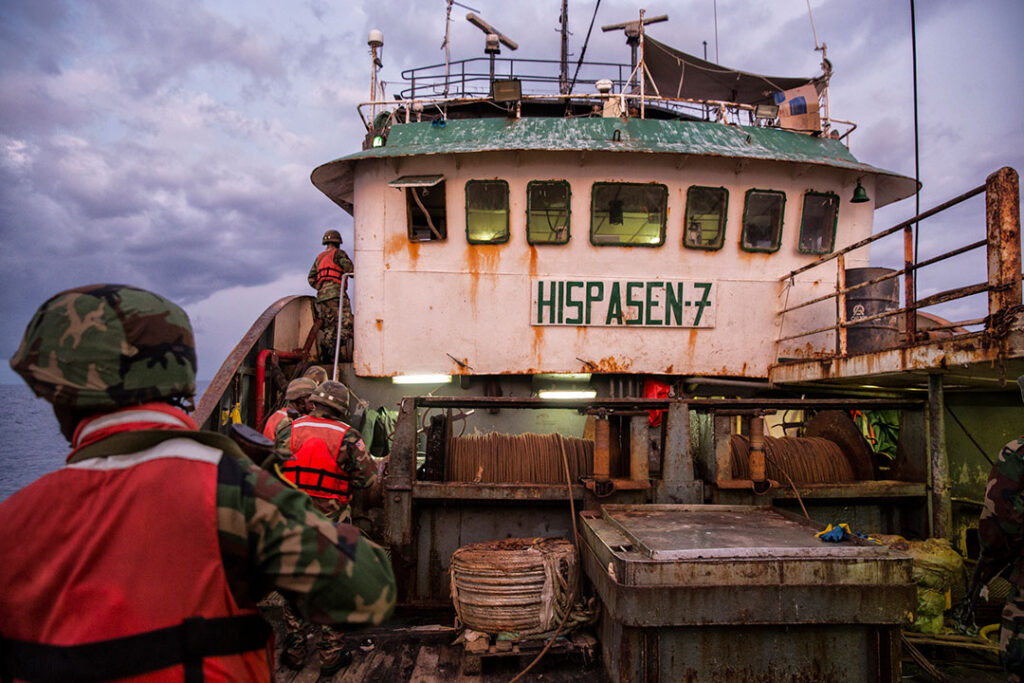Liberia and Côte d’Ivoire have launched joint patrols along the Cavalla River, which forms part of their border, as part of a broader strategy to combine forces against piracy and illegal fishing in the western Gulf of Guinea.
The relationship is important to Liberia, which depends on its neighbors to help it defend its coast, Maj. Gen. Davidson Forleh, chief of staff for the Armed Forces of Liberia, said during the recent African Chiefs of Defense Conference in Nairobi, Kenya.
“It’s important to have relations with countries that we share borders with,” Forleh said. “Bilateral relations, when aligned with regional goals, are not only necessary — they’re essential.”
Joint maritime operations with Côte d’Ivoire are part of broader bilateral and multilateral efforts in the corner of West Africa, Forleh said.
Liberia knows well the benefits of regional cooperation, Forleh said. Regional collaborations helped end Liberia’s civil war and restructure its military. Liberia has relied on its neighbors in Côte d’Ivoire and Sierra Leone to train its young Soldiers, he added.
Now, bilateral cooperation is helping to secure the Cavalla River fishery, which sits just offshore where the river meets the Gulf of Guinea. The river’s load of nutrients supports an extremely productive fishery that has long attracted legal and illegal fishing. One of the most common fish, the cavalla, gives the river its name.
In 2017 and 2018, Liberian authorities captured more than a dozen fishing vessels that crossed into their waters from Côte d’Ivoire and fished in waters reserved for artisanal anglers. Two high-profile interdictions were the FV Hispasen-7 and the Bonheur, both captured near the Ivoirian border by the Liberian Coast Guard.
The crackdown at the mouth of the Cavalla River reduced the amount of illegal fishing in that region, allowing fish stocks to recover. However, experts acknowledged at the time that the success likely was temporary.
Since then, Liberia and Côte d’Ivoire have strengthened their maritime cooperation. In 2022, the two countries signed an agreement to strengthen their cooperative fishery management and define each country’s role in combating illegal fishing.
In September 2024, the two countries conducted a joint exercise designed to target pirates, drug traffickers and illegal fishing in their coastal waters.
Molly Passawe, director of the Freeport of Monrovia, described the exercise as the beginning of a “robust annual initiative.”
“This is just the beginning, and I hope this effort continues to grow stronger in both our countries,” Passawe said. “This partnership is crucial in cracking down on pirates, especially in our waters.”
Liberia and Côte d’Ivoire are parties to the Monrovia Declaration. The agreement, finalized in January, includes Benin, Ghana, Nigeria and Togo, and calls for closing fishing areas during parts of the year, operating joint patrols, and creating a shared registry of vessels permitted to fish in each country’s territorial waters.
In his comments in Nairobi, Forleh emphasized how good relations among military leaders had helped create a cooperative relationship between Liberia and Côte d’Ivoire. Similar relations have helped build Liberia’s ties with Sierra Leone, its neighbor to the northwest across the Manu River. Guinea is the fourth member of the 52-year-old Manu River Union.
In June, Manu River nations met in Monrovia, Liberia, to discuss forming a commission to address long-standing border issues and strengthen maritime surveillance.
Sierra Leonean Brig. Gen. Alimamy Osman Kamara praised the Manu River Union as another example of a regional agreement that works to protect that corner of West Africa from transnational crime.
“I want to submit that it is working,” Kamara said during the Nairobi conference.

